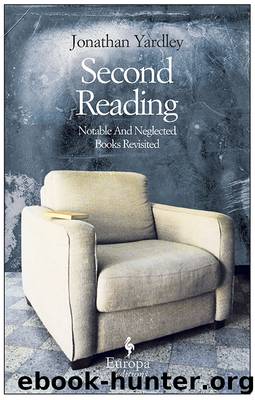Second Reading by Jonathan Yardley

Author:Jonathan Yardley
Language: eng
Format: epub
Publisher: Europa
Published: 2012-10-08T16:00:00+00:00
THE AUTOBIOGRAPHY OF BENJAMIN FRANKLIN
In recent years Americans have become fascinated with their country’s early history, though it’s exceedingly difficult to say precisely why. This is almost entirely at odds with the national character, which tends to view all history as bunk, to look to the future rather than the past; yet David McCullough’s 1776, a vivid account of the first year of the American Revolution, was on the bestseller lists in 2005, just as previously were Joseph Ellis’s Founding Brothers and Walter Isaacson’s Benjamin Franklin. Other books on the Colonial and Revolutionary periods by the likes of Gordon S. Wood, Bernard Bailyn, Edmund S. Morgan and H.W. Brands have sold respectably, and the film The Patriot (2000), starring Mel Gibson, did well.
All of which is nice, though it’s hard to tell whether it reflects genuine interest in the country’s origins or merely passing fancy. In any case, people who have read one or more of the many current books about Benjamin Franklin really ought to direct their attention to the man himself, specifically to The Autobiography of Benjamin Franklin. It is, as Edmund Morgan writes in his foreword to the Yale University Press edition, “the most widely read autobiography ever written by an American,” a book to which countless readers have turned “for what it tells us about Franklin’s view of himself, for its embodiment of American values, for its homely admonitions, its deceptively simple style.” Its “posthumous publication and popularity have made [Franklin] an American founding father in a more intimate fatherly way than the others who earned that title.”
It is the first great American book. Other books of note—particularly the tales of Washington Irving—appeared well before 1867, when the complete text finally came out, but the Autobiography was written before 1790, when Franklin died. My first reading of it was in the late 1960s, during an academic sabbatical from my career in journalism. I sat in on a course in biography taught by a biographer of considerable eminence who included Franklin, as best I can recall, in some measure to mock him and his book, in particular the passages in which he describes his “bold and arduous Project of arriving at moral Perfection.” In the atmosphere of the late 1960s it was easy to make sport of Franklin’s earnest moralizing and his flattering self-portrait. Franklin set himself up as an exemplar for his fellow Americans, and in so doing made himself a fetching target for ridicule.
Still, even that teacher had to acknowledge—and to his credit readily did—that though Franklin doubtless twisted some of the facts of his life to his advantage, his Autobiography is an extraordinary document. It struck me so then, and it strikes me so even more strongly now. For one thing, it is the ultimate Horatio Alger story—which is to say the American success story—in this case about a Boston soapmaker’s son, “the youngest Child but two” among 17, who “emerg’d from the Poverty and Obscurity in which I was born and bred, to
Download
This site does not store any files on its server. We only index and link to content provided by other sites. Please contact the content providers to delete copyright contents if any and email us, we'll remove relevant links or contents immediately.
| Ancient & Classical | Arthurian Romance |
| Beat Generation | Feminist |
| Gothic & Romantic | LGBT |
| Medieval | Modern |
| Modernism | Postmodernism |
| Renaissance | Shakespeare |
| Surrealism | Victorian |
4 3 2 1: A Novel by Paul Auster(11049)
The handmaid's tale by Margaret Atwood(6852)
Giovanni's Room by James Baldwin(5878)
Big Magic: Creative Living Beyond Fear by Elizabeth Gilbert(4723)
Asking the Right Questions: A Guide to Critical Thinking by M. Neil Browne & Stuart M. Keeley(4574)
On Writing A Memoir of the Craft by Stephen King(4213)
Ego Is the Enemy by Ryan Holiday(3991)
Ken Follett - World without end by Ken Follett(3972)
The Body: A Guide for Occupants by Bill Bryson(3801)
Bluets by Maggie Nelson(3710)
Adulting by Kelly Williams Brown(3670)
Guilty Pleasures by Laurell K Hamilton(3586)
Eat That Frog! by Brian Tracy(3514)
White Noise - A Novel by Don DeLillo(3435)
The Poetry of Pablo Neruda by Pablo Neruda(3367)
Alive: The Story of the Andes Survivors by Piers Paul Read(3310)
The Bookshop by Penelope Fitzgerald(3225)
The Book of Joy by Dalai Lama(3217)
Fingerprints of the Gods by Graham Hancock(3212)
